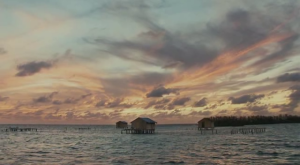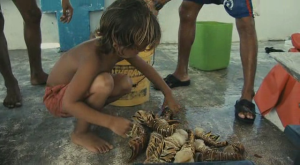I stick to slow films that make me sea sick. Vivan las Antipodas was the first film, but obviously not the last one to confuse my perception of where the actual horizon in a cinematic frame is. A central focus point. Just something for the purpose of orientation.
The similarities between Antipodas and Alamar don’t stop there. True to the matter, I have pointed out the specific opposition of rural/urban in Antipodas, which is not a dominant theme in the film, but a vital one for my interest. Alamar goes even further, and is, similar to Michela Occhipinti’s Letters from the Desert (2012) a subtle attack at the way we live; in the West, or in urban centres, or in rich countries. Whatever you choose – it is subtly attacked in this lovely and very peaceful tale of a father-son relationship.
The opening of the film tells us in brief about Jorge and Roberta, a couple for three and a half years, parents to son Natan, who got divorced based on, I find, striking “differences”. One aspect is the different perception of reality. In a voiceover, Roberta tells us: “Look at how we live now. He’s in the middle of the jungle in the sea, in the middle of nowhere. I couldn’t live here. I would die in a place like this.” Roberta is from Italy. The slow backward life clashes with a modern lifestyle. The product is a divorce; Roberta takes custody of Natan.

Alamar, Pedro Gonzales-Rubio
In Alamar, five-year old Natan joins his father for a “holiday trip” to the roots of basic living. Of living with nature. Jorge is keen on teaching his son how to fish, how to scale the fish, how to make a life and enjoy life faraway from modernity and civilisation. Just the way he himself had grown up.
The film is almost entirely set on the sea (hence the sea sickness). We’re either on a boat, or in a hut built on some pillars, surrounded by water. There is water everywhere, and this is the first slow film I have encountered where the sea plays such an important role. The sea stands for freedom, for vastness, for fullness, too. In many ways, what we associate now with urban spaces, especially the fullness and freedom, comes from a very basic life we had before modernity took hold. The use of the sea as a continuous background is thus absolutely vital to the message Gonzales-Rubio wants to deliver.
In one scene, Jorge and his father get dinner ready. They have prepared fish and tortillas. This interesting conversation follows:
Natan: It’s the barracuda, right?
Jorge: Yes, it is. There are the tortillas, please eat.
Natan: I don’t want lobster.
Jorge: There is no lobster. This is barracuda. Eat.
Grandfather: I bet you don’t have that in Italy.
Natan: They don’t go fishing there.
Jorge: They don’t fish, right, son?
Natan: The fish is already bought in Italy.

Alamar, Pedro Gonzales-Rubio
There are two points here. First, Natan is illiterate in sea food. He has obviously never learned what the difference between a lobster and a barracuda is. But then, how is he meant to learn this where he lives, and is it really of importance to him? Or to us, in that matter. I remember that I learned different fish species in primary school, but this knowledge is pretty much gone. Do I need it where I live? Not really. It would be an entirely different story, though, if I had to go out fishing for food on my own.
Second, the conversation contains the subtle attack on Western lifestyle/consumerism I mentioned before. People in Italy don’t fish. They go into a supermarket, and buy fish if they want some. Father and grandfather imply that their way of doing things is better.
In general, you get a sense that, while Natan appears hesitant here and there (which I take from his illiteracy in this new world), he seems to enjoy this new place. It’s probably adventurous for him. On the other hand, when he is back in Italy at the end of the film, he appears equally comfortable. I suppose this is the luxury of being little: you adapt pretty quickly to whatever surrounding you’re in.
This film is definitely worth working on in more detail at some other time.
